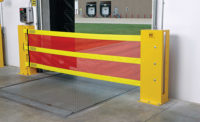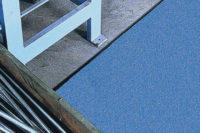2013 was a fruitful year for Citrus Systems Inc. — from both a literal and business standpoint. That year, the private-label drink manufacturer finally left its original 68,000-square-foot complex in Minneapolis and expanded into a much-needed, new 135,000-square-foot facility in west suburban Hopkins.
Unfortunately, while the new building allowed Citrus Systems to increase production of its fruit and vegetable blends, concentrated juices, teas and other custom products, it carried over the same antiquated dock equipment used in the old one. And that caused a noisy, painful problem.
Every day was hump day
The same loud “ker-THUMP” sound that forklifts accessing semi-trailers made in the old plant could still be heard in the Hopkins facility. Because of its dated pull-chain levelers, Citrus Systems’ forklift operators had to drive over a hump — the welded plate in front and a fold-down lip on the back of the leveler — every time they entered or left the trailer.
Besides the annoying sound it made, the dock leveler hump was causing extra wear and tear on forklifts and the backs of forklift operators. This whole body vibration, or “dock shock,” can lead to long-term health problems if not addressed.
A lack of restraint
Another issue was that truck restraints couldn’t be mounted on two of the docks, meaning wheel chocks had to be used to hold trucks in place during loading and unloading. While no accidents ever came of this setup, there was a safety concern.
Another side effect of the outdated dock equipment was that shrink wrap was stretching on the top layers of loads – especially taller loads – as the trailers jostled around. That destabilized the pallets and loads, making the products more vulnerable to damage during transit. Considering Citrus Systems employs a chemist and microbiologist to perform shelf life and microbiological product testing, this was a particularly frustrating quality control issue.
Smoothing out safety concerns
Greg Nicholas, chief operating officer of Citrus Systems, was determined to rectify the loading dock problems that followed Citrus Systems from the old facility to the new one. As he searched for loading dock upgrades, he specifically wanted to find loading dock equipment that would improve safety and efficiency. In early 2014 the company outfitted its nine dock doors with a big safety upgrade.
Nicholas cited lights as another example of improved safety. Located at the top corners on the inside of each dock opening, acrylic tube lights offer at-a-glance status information for forklift operators. The lights automatically turn green when the trailer is locked to indicate that it's safe for forklifts to enter.
In addition to improving safety and enhancing quality control, the smoother entry has also raised productivity. Lift-truck drivers were forced to slow to a crawl to go over the hump in the old facility, but now they can maintain their speed when entering or exiting the trailer.
The company’s maintenance costs have also dropped. The dock upgrades have allowed Citrus Systems to simultaneous enhance safety, cut operational costs and keep up with an increased volume of in-bound and out-bound shipments. And that deafening “ker-THUMP” sound? Like the wheel chocks and the pull-chain levelers, it's a thing of the past.



